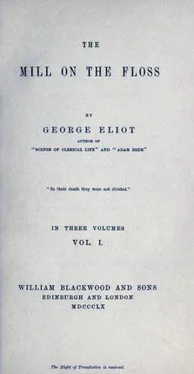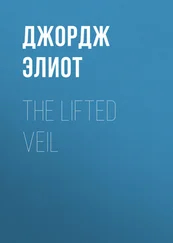Tom had protested against entertaining the proposition. He shouldn't like his father to be under Wakem; he thought it would look mean-spirited; but his mother's main distress was the utter impossibility of ever "turning Mr. Tulliver round about Wakem," or getting him to hear reason; no, they would all have to go and live in a pigsty on purpose to spite Wakem, who spoke "so as nobody could be fairer." Indeed, Mrs. Tulliver's mind was reduced to such confusion by living in this strange medium of unaccountable sorrow, against which she continually appealed by asking, "Oh dear, what have I done to deserve worse than other women?" that Maggie began to suspect her poor mother's wits were quite going.
"Tom," she said, when they were out of their father's room together, "we must try to make father understand a little of what has happened before he goes downstairs. But we must get my mother away. She will say something that will do harm. Ask Kezia to fetch her down, and keep her engaged with something in the kitchen."
Kezia was equal to the task. Having declared her intention of staying till the master could get about again, "wage or no wage," she had found a certain recompense in keeping a strong hand over her mistress, scolding her for "moithering" herself, and going about all day without changing her cap, and looking as if she was "mushed." Altogether, this time of trouble was rather a Saturnalian time to Kezia; she could scold her betters with unreproved freedom. On this particular occasion there were drying clothes to be fetched in; she wished to know if one pair of hands could do everything in-doors and out, and observed that she should have thought it would be good for Mrs. Tulliver to put on her bonnet, and get a breath of fresh air by doing that needful piece of work. Poor Mrs. Tulliver went submissively downstairs; to be ordered about by a servant was the last remnant of her household dignities, — she would soon have no servant to scold her. Mr. Tulliver was resting in his chair a little after the fatigue of dressing, and Maggie and Tom were seated near him, when Luke entered to ask if he should help master downstairs.
"Ay, ay, Luke; stop a bit, sit down," said Mr. Tulliver pointing his stick toward a chair, and looking at him with that pursuant gaze which convalescent persons often have for those who have tended them, reminding one of an infant gazing about after its nurse. For Luke had been a constant night-watcher by his master's bed.
"How's the water now, eh, Luke?" said Mr. Tulliver. "Dix hasn't been choking you up again, eh?"
"No, sir, it's all right."
"Ay, I thought not; he won't be in a hurry at that again, now Riley's been to settle him. That was what I said to Riley yesterday — I said—"
Mr. Tulliver leaned forward, resting his elbows on the armchair, and looking on the ground as if in search of something, striving after vanishing images like a man struggling against a doze. Maggie looked at Tom in mute distress, their father's mind was so far off the present, which would by-and-by thrust itself on his wandering consciousness! Tom was almost ready to rush away, with that impatience of painful emotion which makes one of the differences between youth and maiden, man and woman.
"Father," said Maggie, laying her hand on his, "don't you remember that Mr. Riley is dead?"
"Dead?" said Mr. Tulliver, sharply, looking in her face with a strange, examining glance.
"Yes, he died of apoplexy nearly a year ago. I remember hearing you say you had to pay money for him; and he left his daughters badly off; one of them is under-teacher at Miss Firniss's, where I've been to school, you know."
"Ah?" said her father, doubtfully, still looking in her face. But as soon as Tom began to speak he turned to look at him with the same inquiring glances, as if he were rather surprised at the presence of these two young people. Whenever his mind was wandering in the far past, he fell into this oblivion of their actual faces; they were not those of the lad and the little wench who belonged to that past.
"It's a long while since you had the dispute with Dix, father," said Tom. "I remember your talking about it three years ago, before I went to school at Mr. Stelling's. I've been at school there three years; don't you remember?"
Mr. Tulliver threw himself backward again, losing the childlike outward glance under a rush of new ideas, which diverted him from external impressions.
"Ay, ay," he said, after a minute or two, "I've paid a deal o' money — I was determined my son should have a good eddication; I'd none myself, and I've felt the miss of it. And he'll want no other fortin, that's what I say — if Wakem was to get the better of me again—"
The thought of Wakem roused new vibrations, and after a moment's pause he began to look at the coat he had on, and to feel in his side-pocket. Then he turned to Tom, and said in his old sharp way, "Where have they put Gore's letter?"
It was close at hand in a drawer, for he had often asked for it before.
"You know what there is in the letter, father?" said Tom, as he gave it to him.
"To be sure I do," said Mr. Tulliver, rather angrily. "What o' that? If Furley can't take to the property, somebody else can; there's plenty o' people in the world besides Furley. But it's hindering — my not being well — go and tell 'em to get the horse in the gig, Luke; I can get down to St. Ogg's well enough — Gore's expecting me."
"No, dear father!" Maggie burst out entreatingly; "it's a very long while since all that; you've been ill a great many weeks, — more than two months; everything is changed."
Mr. Tulliver looked at them all three alternately with a startled gaze; the idea that much had happened of which he knew nothing had often transiently arrested him before, but it came upon him now with entire novelty.
"Yes, father," said Tom, in answer to the gaze. "You needn't trouble your mind about business until you are quite well; everything is settled about that for the present, — about the mill and the land and the debts."
"What's settled, then?" said his father, angrily.
"Don't you take on too much bout it, sir," said Luke. "You'd ha' paid iverybody if you could, — that's what I said to Master Tom, — I said you'd ha' paid iverybody if you could."
Good Luke felt, after the manner of contented hard-working men whose lives have been spent in servitude, that sense of natural fitness in rank which made his master's downfall a tragedy to him. He was urged, in his slow way, to say something that would express his share in the family sorrow; and these words, which he had used over and over again to Tom when he wanted to decline the full payment of his fifty pounds out of the children's money, were the most ready to his tongue. They were just the words to lay the most painful hold on his master's bewildered mind.
"Paid everybody?" he said, with vehement agitation, his face flushing, and his eye lighting up. "Why — what — have they made me a bankrupt?"
"Oh, father, dear father!" said Maggie, who thought that terrible word really represented the fact; "bear it well, because we love you; your children will always love you. Tom will pay them all; he says he will, when he's a man."
She felt her father beginning to tremble; his voice trembled too, as he said, after a few moments:
"Ay, my little wench, but I shall never live twice o'er."
"But perhaps you will live to see me pay everybody, father," said Tom, speaking with a great effort.
"Ah, my lad," said Mr. Tulliver, shaking his head slowly, "but what's broke can never be whole again; it 'ud be your doing, not mine." Then looking up at him, "You're only sixteen; it's an up-hill fight for you, but you mustn't throw it at your father; the raskills have been too many for him. I've given you a good eddication, — that'll start you."
Читать дальше












